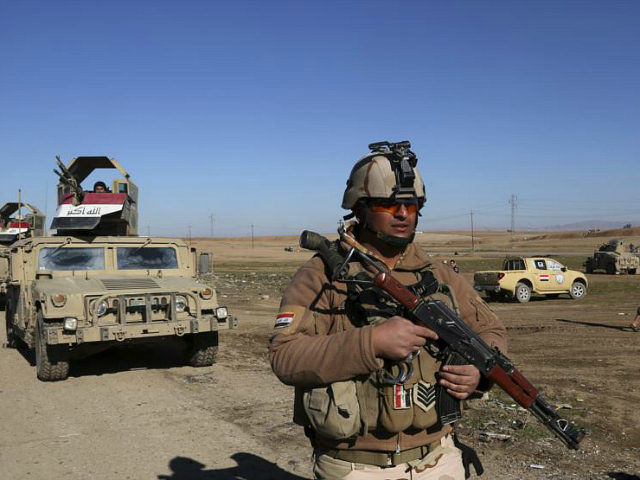Iraqi Prime Minister Haider al-Abadi announced on Tuesday that the battle to liberate the eastern half of Mosul, the Islamic State’s largest stronghold in the country, had successfully concluded.
“Daesh has quickly collapsed and no one expected such collapse,” Abadi said during remarks to reporters, using the Arabic acronym for ISIS. “The heroism of our security forces was behind Daesh’s defeat.” He described eastern Mosul as “fully liberated,” meaning Iraqi forces had cleared all Islamic State terrorists from every block in the area.
Iraq’s American allies on the ground echoed Abadi’s praise for his troops. “This would have been a difficult task for any army in the world… and to see how far the Iraqis have come since 2014, not only militarily, but in their ability to put their differences aside and focus on a common enemy, gives real hope to the people of Iraq,” the commander of the international coalition in Mosul, U.S. Army Lt. Gen. Stephen J. Townsend, said in a statement. He warned, however, that there remained “a long way to go before ISIL is completely eliminated from Iraq.”
The Iraqi government, a U.S.-led international coalition, and a number of native forces on the ground including the mostly-Shiite Popular Mobilization Forces (PMF) and the Kurdish Peshmerga began the mission to liberal Mosul in October 2016, little more than two years after the Islamic State conquered Iraq’s second-largest city. The Kurdish and PMF forces surrounded Mosul, eradicating Islamic State terrorists from its suburbs and outskirts touching city limits before the Iraqi military entered the city itself.
The battle within the city, which accelerated in intensity in December, proved difficult. Troops were forced to “crater” roads with bombs and airstrikes to prevent Islamic State terrorists from using car bombs. Soldiers “disabled” four of the city’s five bridges. They contended with the demands of newly-liberated civilians, who needed food and information on missing relatives. Some, according to human rights groups, committed abuses against “liberated” civilians, which Abadi has vowed to investigate.
According to UPI, the international coalition’s mission has so far consisted of “558 airstrikes, destroying at least 151 car bombs, 361 buildings and facilities, 140 tunnels, 408 vehicles, 392 bunkers, 24 anti-air artillery systems and 315 artillery and mortar systems.”
Abadi has warned that conquering western Mosul may prove more challenging than the first half of the mission. As Reuters notes, intelligence officials believe that the Islamic State’s leadership, including “caliph” Abu Bakr al-Baghdadi, were headquartered largely in western Mosul. Its streets are significantly more narrow and, due to the ongoing battle, many expect ISIS to keep its most seasoned fighters in the area.
Officials speaking to the Kurdish outlet Rudaw said they see desperation in the Islamic State fighters they are engaging. “The structure and the cohesive organization of Daesh is starting to crumble,” coalition ground forces commander Maj. Gen. Joe Martin told Rudaw on Wednesday. “They’re innovative but so are we. They’re tenacious but the Iraqi Security Forces are more tenacious.”
Among their innovations is the debut of a weaponized commercial drone, carrying grenades and other small explosives and dropped on enemy targets with no regard for civilian life. And reports suggest that among the signs of desperation are mass executions of Islamic State members who have attempted to flee or refused to fight the Iraqi army.

COMMENTS
Please let us know if you're having issues with commenting.